What are the benefits of eating raw cilantro?
Cilantro is also a fan, there are black powder, some friends eat meat have to have cilantro, some friends smell the flavor to avoid retreat, as if the durian, a few happy a few sad. Personally, I prefer to eat cilantro, let me drink a bowl of soup with only cilantro I am also happy, but this is estimated to be a nightmare for some friends. No way, everyone's sense of smell, taste sensitivity varies from person to person, and everyone has their own preferred tastes, do not love to eat cilantro, but love to eat cilantro friends are very blessed Oh, because cilantro is a nutritional value of plant foods.
Cilantro has a unique flavor, a unique aromatic volatile essential oils, can be used as a seasoning for dishes, can remove the fishy taste, increase the freshness, aroma, and promote appetite. Cilantro is also rich in a variety of minerals, such as calcium, magnesium, potassium, iron, copper content is not low, and even higher than the common vegetables quite a lot, the more prominent is calcium, potassium, iron elements, 100g of cilantro can provide as much as 100mg of calcium, 272mg of potassium.

Cilantro is also rich in vitamins, 100g cilantro contains 48mg vitamin C, 310ug vitamin K, 52.9mg vitamin P. Many friends may not be familiar with vitamin K and vitamin P. Vitamin K has a very important role in the human body, vitamin K can guide the correct deposition of calcium, to avoid the deposition of calcium in the wrong location or cause stones, to better prevent calcium deficiency. Vitamin P can improve blood cholesterol levels, can assist in the breakdown of neutral fats, bad cholesterol, and has the effect of improving blood flow, which is also important for the human body. Cilantro is also rich in B vitamins; cilantro, although low-fat and low calorie, dietary fiber content is very rich, appropriate consumption helps to improve constipation. The extracts of cilantro also have the effect of sweating and rashes.
Traditional medicine called "coriander", warm and pungent, can enter the lungs into the stomach, the main effect is published through the rash, there is the effect of stomach, if there is measles, colds, colds without sweating, indigestion, loss of appetite, often with cilantro to improve. There are many volatile components in cilantro, such as dipentene, flavonoid glycosides, etc., which can promote gastrointestinal peristalsis and gastric acid secretion, thus helping to improve appetite.
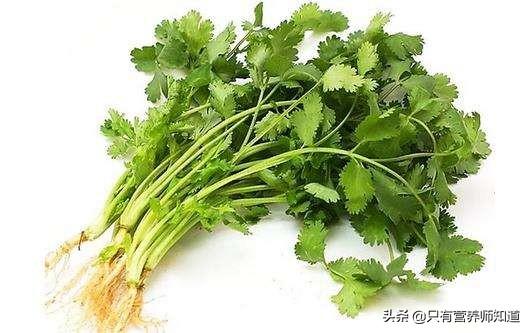
Although cilantro is a good food, but we have not seen much eating cilantro practice, because cilantro is also not advisable to eat more, cilantro is sweating through the rash of food, eat too much may promote excessive secretion of sweat glands, resulting in discomfort; although cilantro pungent and warm, the internal through the heart and the spleen, and outside the limbs, the righteousness, but it is also the same, cilantro's "scattered" Stronger, eat more, eat too often may lose vital energy, let a person weak, gas deficiency, for some of the body was weak, gas deficiency, fatigue, sweating and night sweating people, cilantro should be eaten sparingly. In addition, cilantro "loose" strong, if the original body odor friends eat may make the smell more serious; cilantro through the rash, eat more cilantro will lead to skin easily acne spots, sun may be more likely to make the skin itchy allergies,
Eating cilantro has the following effects:
First, cilantro contains unique volatile oil, can play the role of aroma and flavor, there is a certain appetizing effect. Secondly, the dietary fiber content of cilantro is very high, can promote the digestion of the gastrointestinal tract, can play the effect of laxative. Third, cilantro contains a lot of vitamin C, can play a role in beauty. But cilantro can not eat more, for men, cilantro can play a spermicidal effect; in addition, cilantro belongs to a kind of photosensitive substances, easy to allergic to the body to eat cilantro, easy to cause allergic reactions.

Cilantro, also known as coriander, is not only a vegetable, but also a natural plant spices, native to the Mediterranean coast, the Western Han Dynasty Zhang Qian mission to the Western Regions will be introduced into our country, has a history of more than two thousand years.
Tender in color and crisp in taste, cilantro is often used as a flavor enhancer and garnish for dishes because of its special aroma.
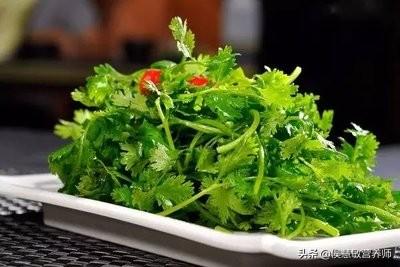
Cilantro is also rather amazing to say the least, those who love it will find it fragrant, but those who hate it will find it stinky. Whether cilantro is fragrant or stinky is quite controversial. The Latin name for cilantro is Coriandrum, which originated in Ancient Greek and is said to have been borrowed from the name of a local stink bug. However, because of its stems and leaves contain a special aromatic flavor, so the folk commonly known as cilantro.
Many people think that people who don't eat cilantro are pretentious and picky eaters, but it's actually partly genetically determined. Some studies have found that people who don't like cilantro have a specific gene in their bodies that detects the unique odor in cilantro, so they can be particularly sensitive to the flavor and find it difficult to accept. Of course there are also some people who are influenced by their environment, and some will have a beginning aversion that slowly becomes a favorite.
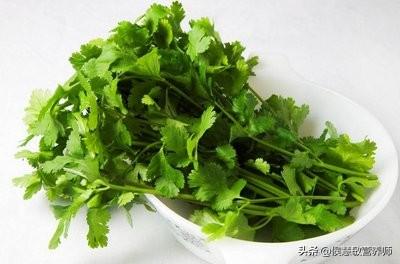
In addition to being a vegetable, cilantro also has some medicinal value. According to the Compendium of Materia Medica, "Coriander is pungent, warm and fragrant, and passes through the heart and spleen, and reaches the limbs." Cilantro is warm and pungent in nature, entering the lung and stomach meridians, and has the effects of strengthening the stomach with aroma, eliminating food and gas, awakening the spleen and the middle, dispelling wind and detoxifying, sweating and rashes.
Cilantro as a green leafy vegetable, the nutritional value is still not low, rich in vitamins, minerals, dietary fiber and phytochemicals. More prominent is vitamin C, calcium, potassium and carotene, of which the content of vitamin C is 48mg/100g, also ranked in the vegetables in the middle and upper, and cilantro is usually eaten raw, not after high-temperature cooking, the loss of vitamin C is also very small. The calcium content of cilantro is as high as 101mg/100g, which is close to the calcium in milk. The carotene content is 1160 micrograms/100g and the potassium content is 272mg/100g, both of which are also in the upper echelon of similar vegetables.
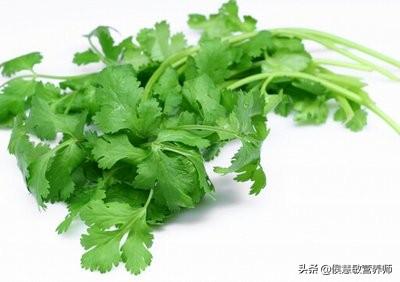
In conclusion, cilantro as a vegetable with rich nutritional value, people who can accept its flavor can enjoy its deliciousness while gaining certain health benefits, and those who can't accept its flavor don't have to force themselves to get nutrition through other vegetables.
The benefits of eating cilantro:1 can strengthen the stomach and eliminate food.
2 soften blood vessels to prevent cardiovascular diseases
3 can supplement iron
4 can be supplemented with vitamin B2
Cilantro, the cilantro acts mainly as a refresher.
Cilantro, also known as coriander, coriander, caraway, etc., because of its leaves and stems have a unique aromatic flavor, so the folk also known as cilantro, cilantro can not only be used as some of the dishes of the ingredients fried and eaten, but also as a number of soups sprinkled with vegetables, do not know that eating raw is more beneficial to health.
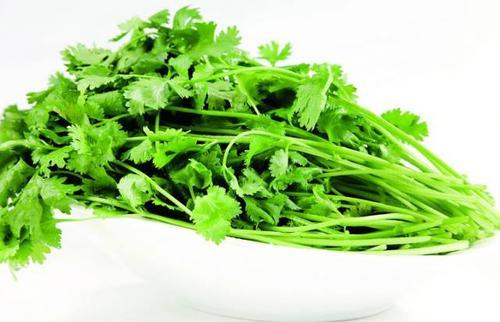
Eating raw cilantro can help us to a great extent to help us intake of more nutrients fire, cilantro in cooking will easily lead to a large number of nutrients are destroyed and lost. For example, cilantro contains vitamin C once heat will be decomposed, and cilantro this material contains a certain amount of B vitamins, it is easy to dissolve in water; no matter what vegetables in the cooking is easy to lead to a large number of vitamin loss.
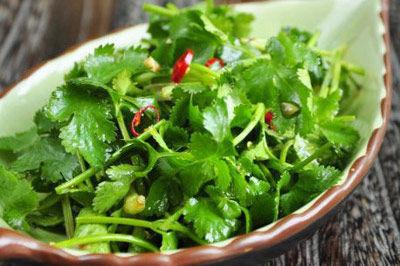
So eating raw cilantro is undoubtedly the best way to retain the nutritional value of cilantro. However, before we eat raw cilantro, please remember to clean the cilantro, to avoid eating into the parasites and some bacteria and viruses and other hazards, that can be harmful to health.
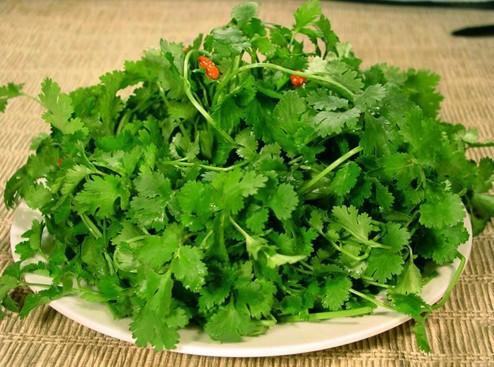
Cilantro, high, expensive and flavorful. A dish that has been hyped up in the last decade or so.
Seriously, I particularly disliked it when I was a kid, that is, I still don't like it when I'm older. Then I saw that it was slowly getting more expensive, and some people ate a small stick of it for show. I had no choice but to learn to eat it with others.
I've gotten used to it over time, and I don't feel it's any different than any other dish, except for the fact that it's expensive.
Now someone mentioned to eat raw cilantro to avoid the loss of its nutrients, this argument has some truth, but get it wrong will have diarrhea. Like now this winter, more do not eat raw things, cold a little bit should not.
Truth be told, the human diet is all about a balance, and to say that there is that one single food that balances all the needs of the body is obviously a lie.
That's why it's said that cilantro, with its distinctive aroma, can't be compared to any other dish. That is all.
It's not an elixir, there's no need to tend to it.
A balanced diet is best.
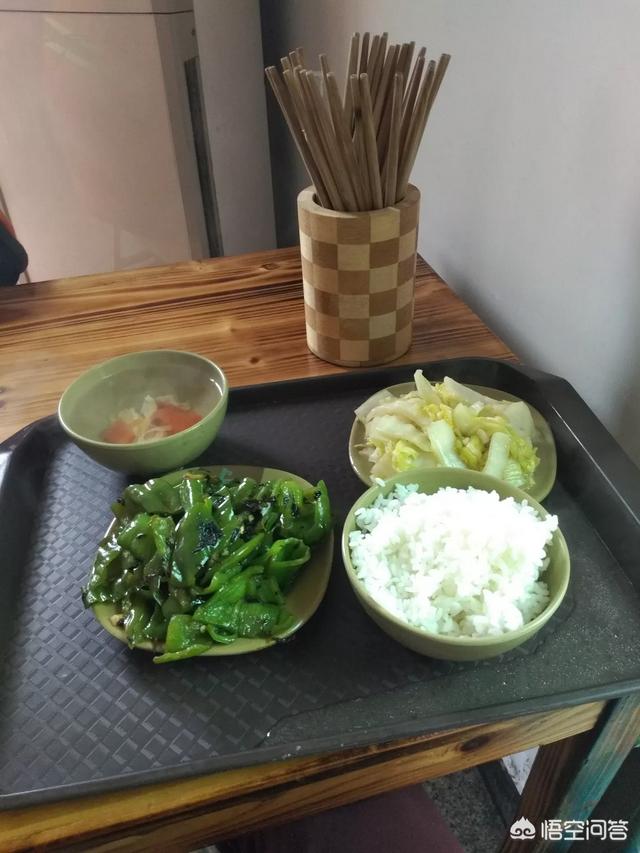
Cilantro, also known as coriander, has a pretty long history. In 5000 BC, the Egyptians have begun to eat it. During the Han Dynasty, cilantro seeds were brought back from the Western Regions by Zhang Qian through Central Asia. Since then, it has gradually become a delicacy on people's tables.
Cilantro was introduced to the Americas in 1670, and European settlers began using it to make spices - using the leaves and seeds to mask the stench of bad meat. To this day, coriander seeds are often put into European-style sausages.
I think the cilantro this vegetable is particularly interesting, it is like the durian, like people especially like, think it is the fragrance of the spleen, the spirit can also be uplifted; and loathe it is the people can not smell the smell at all, can not wait to stay away from the distance.
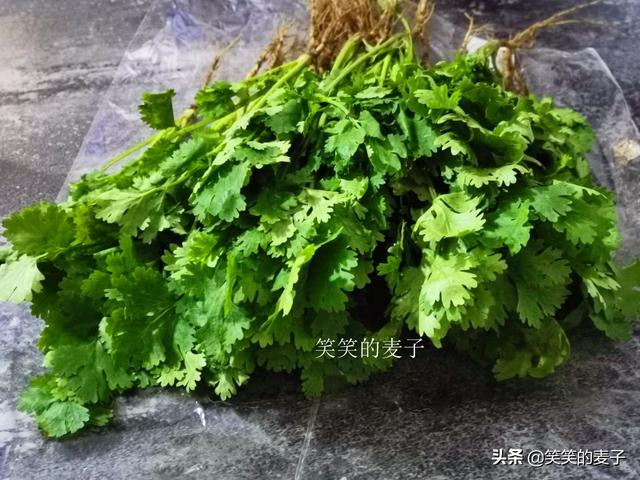
Cilantro is rich in calcium, zinc, potassium, vitamin A and vitamin C. It contains essential oils that can promote salivary secretion, accelerate bowel movements and improve appetite, so many people like to eat it.
It is used in stir-fries and hot pots, but it is most commonly used as a spice in everyday dishes. Raw cilantro often takes its place in seasonings when you buy snacks that need seasoning at street stores.
Increasing appetite is one of the benefits of cilantro, and improving digestion is another, for the same reason that green leafy vegetables are high in fiber. We sometimes stir-fry cilantro with enoki mushrooms at home, both of which are great for cleansing the stomach and intestines.
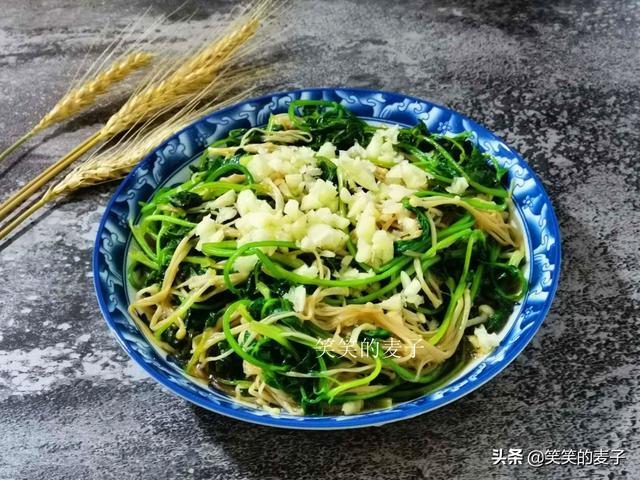
Cilantro is warm and has the effect of sweating, some people like to boil it and drink it at the beginning of a cold. There was a friend, his stomach is not very good, he will use wine to soak raw cilantro, sealed soak for a period of time, drink some wine every day, even with the inside of the soaked cilantro also eat. I think this is also one of the benefits of eating raw parsley.
Although cilantro is good, but do not eat too much. Our old man here regarded cilantro as hair, sometimes need to abstain from onion, ginger and garlic when, along with the cilantro also abstained from. This is probably because the cilantro pungent warm sake it.
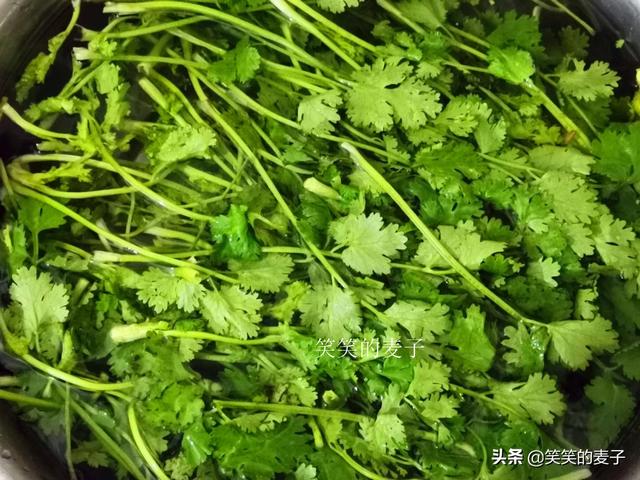
Cilantro, if used only as a spice, is not used in large quantities each time, even if you buy a little bit more, so how do you properly store cilantro at home?
We can put the parsnips in a plastic bag along with a small piece of carrot or white radish, then tie the bag tightly and put it in the refrigerator to keep it for a longer period of time.
In life, each vegetable will have its different benefits, but there is no need to eat too much because it is good. The opposite is true, as if the raw food cilantro, eating too much is likely to make the gas deficiency, so although the cilantro is delicious, moderate consumption on the line.
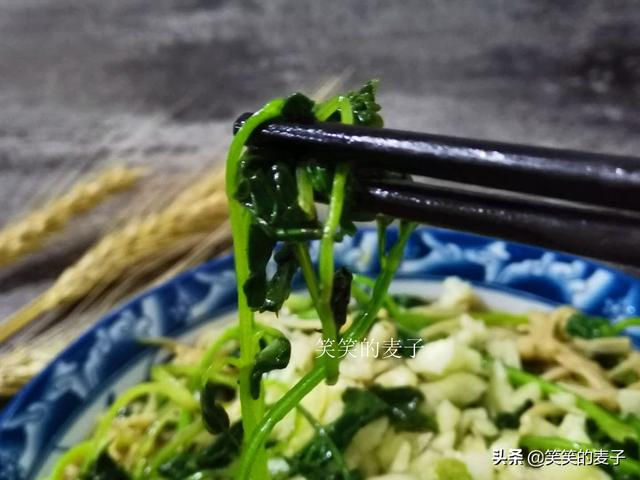
Life is very real faggotry, a fiddle and a dipper. I'm Smiling Mai, thanks for reading and if you have better ideas, feel free to comment or leave a message below! If you like this article, I hope you can give me a like and follow me a little bit, and finally don't forget to help me share, retweet it! Special thanks!
Thanks for the invitation. When it comes to "healthy meals", vegetables are often one of the plant foods that have to be mentioned. Vegetables are very important, but the daily consumption is not enough; vegetables are very tasty, but many people always stick to the few vegetables they like to eat. Summer leisure, want to talk to you through the text of a "special flavor of the vegetables - cilantro". Summer eat some cilantro, you will love to eat more; summer eat some cilantro, your meals will become more delicious. There are some things I want you to know about healthy tasting cilantro.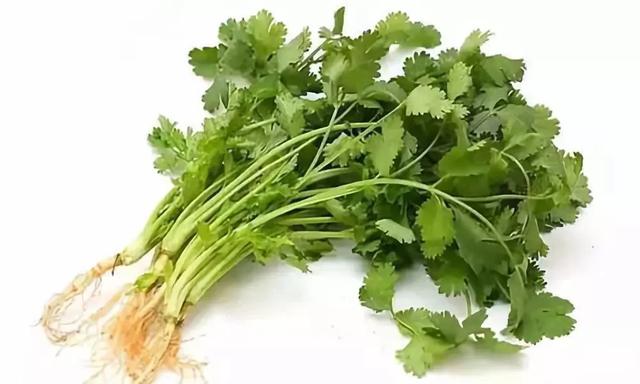
Cilantro, why does it have a "flavor"?
The fundamental reason why cilantro has a special flavor is attributed to some of the substances it contains. Cilantro contains more than 40 phytochemicals, 82% of which are aldehydes and 17% are alcohols, and the "aldehydes" are the source of the strong flavor of cilantro.
Eating cilantro has a number of health benefits:
- Appetizing and enhancing appetite:
Compared to other vegetables, cilantro has a unique flavor. Because of this unique flavor and good taste, eating cilantro will have a good "appetite" effect and make you love to eat more in the hot summer.
- Supplemental nutrients:
Cilantro is a vegetable that is rich in many nutrients. Dosage aside, cilantro contains a respectable dose of chlorophyll, vitamin C, dietary fiber and a variety of phytochemicals, which are undoubtedly a good thing to consume regularly to replenish the body with these nutrients.
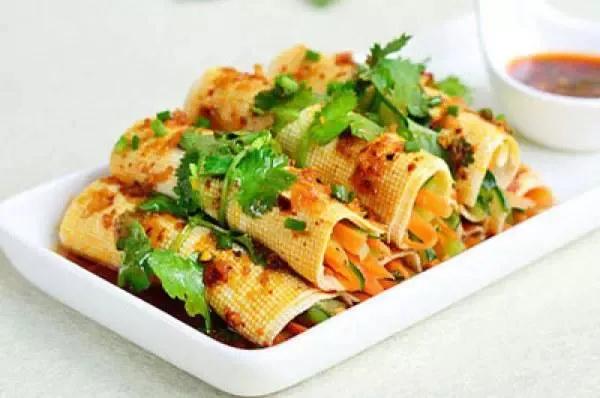
- Promotes intestinal metabolism and prevents constipation:
Similar to celery, spinach, parsley is also a kind of vegetables eaten with a "throat" feeling, which is because it is rich in dietary fiber. Often eat cilantro, often through the cilantro supplement dietary fiber, can undoubtedly promote intestinal metabolism, in order to promote defecation, which can prevent constipation, colon cancer and other intestinal problems.
- Add to your daily vegetable intake:
"Dietary Guidelines for Chinese Residents" recommended that adults consume 300-500 grams of vegetables in a single day, and many people always let this vegetable intake get very troublesome.
Adding parsley to your meals can certainly "support" your daily vegetable intake.
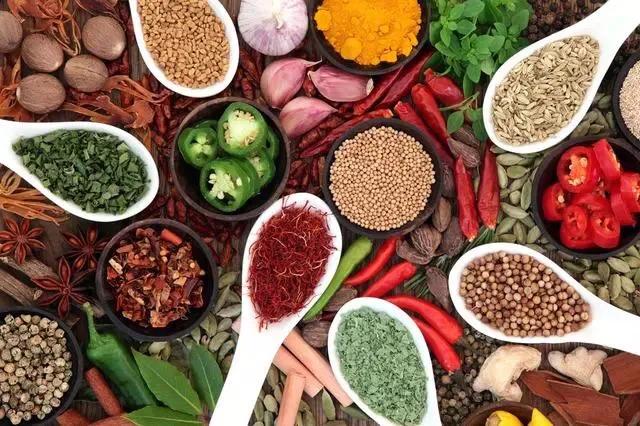
There are many ways to eat cilantro and help you savor the flavor:
- Cilantro:
Cilantro has a special flavor, color and deliciousness, and it is more reliable to use it to mix a cold dish; for example, cilantro with beef, cilantro fungus, cilantro onion and other dishes.
- Garnish the food and add flavor:
Boil a bowl of noodles, we can add some cilantro on top; stew a plate of meat, cilantro can also add a special aroma; simmer a bowl of soup, cilantro can also be a delicious provider.
Eat cilantro and be reliable:
Cilantro, the leaves are much more tender than the root, you can properly bias the choice; in addition, for cilantro, edible methods are relatively more, it is recommended that you can and a variety of meat with the production of cooking, meat and vegetables, to remove the muck, greasy taste; can also be fried with carrots, beautiful color and rich in nutrients; eat seafood with a bit of cilantro, a good removal of the flavor; eat noodles with a bit of cilantro to enhance the flavor, is also a good way.
In the end, cilantro is a good vegetable, tasty and refreshing, and we recommend you to consume it regularly. If you look at cilantro reliably, taste it healthily, and use it flexibly in all kinds of cuisine, your life will be colorful.

Note: Wang Silu original content, I hope to help you; images from the network, if any infringement, please inform the deletion.
Cilantro is a good thing, and I'll explain the benefits of eating it one by one.
History of Cilantro
Cilantro, also known as Manzanita and Coriander, is the whole herb of Coriander, an annual or biennial herb of the genus Coriander in the family Umbelliferae. Cilantro is named for the special aroma contained in its young stems and fresh leaves, because it contains many volatile oils and therefore has a special aroma. But this aroma is not everyone can tolerate, some people are addicted to this flavor, some people fear to avoid it.
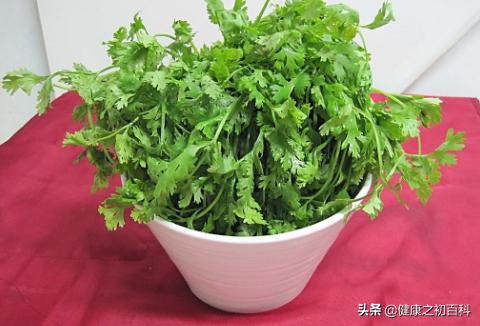
In fact, the origin of coriander is not China, but in the distant Mediterranean coast and Central Asia, 119 AD when Zhang Qian introduced from the Western Region, in our country has more than 2,000 years of planting history. Coriander is a basically essential condiment on our dinner table.
Cilantro Nutrition Facts
Cilantro is rich in nutrients, containing sugar, protein, calcium, phosphorus, iron and a large number of vitamin A original, vitamin B1B2, vitamin C and niacin. Cilantro contains a lot of volatile oils, which can enhance the flavor and aroma.
Cilantro Effects
Cilantro has the effect of detoxifying the epidermis and rashes, strengthening the stomach and eliminating food, ascending and dispersing the qi, etc. It is a food that warms the middle and strengthens the stomach and nourishes the health of the body.
(1) Hypoglycemia
Cilantro lowers blood sugar without affecting plasma insulin reduction.
(2) Improvement of appetite
The flavor of cilantro can enhance appetite, and as a condiment it can also strengthen the spleen, dispel wind and relieve grease.
(3) Clearing heat and penetrating rash
Cilantro and carrot stew rubbed on measles patients to act as a penetrating agent.
(4) Promotion of blood circulation
Cilantro contains sunken sesquiterpene oleic acid which can promote blood circulation. The special flavor also promotes secretion of sweat glands and sweating of the body, which is suitable for wind-cold flu.
Good life from the beginning of health, the beginning of health, health science professional media.
This question and answer are from the site users, does not represent the position of the site, such as infringement, please contact the administrator to delete.